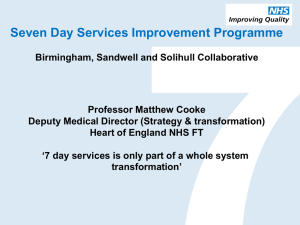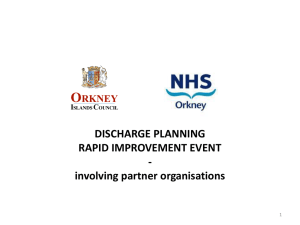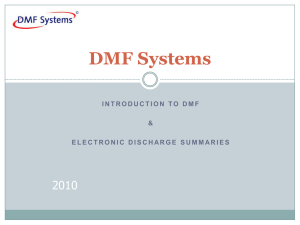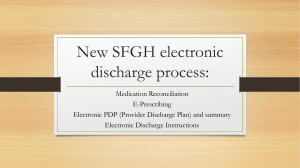CICU Quality Improvement Orientation
advertisement
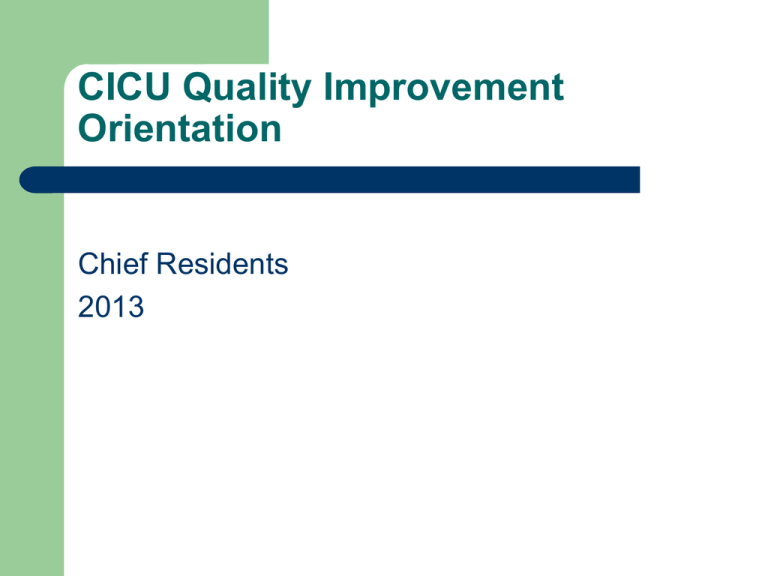
CICU Quality Improvement Orientation Chief Residents 2013 Objectives Improve quality of patient care in the CICU by providing “just in time” teaching on the following key aspects of discharge planning: – – – Clinical Documentation Core Measures Discharge Planning Clinical Documentation Leslie Schultz, RN, BSN – Clinical Documentation Improvement Specialist in CICU Understanding MS-DRGs Medical Severity-Diagnostic Related Groups (MSDRG) – The system used for hospital inpatient admission reimbursement – Physician documentation is the basis for coding – Lab/Imaging can only be coded for when the physician indicates their clinical significance in the A&P – Documentation needed for proper coding has specific requirements that are different than those needed for clinical care Documentation of all pertinent diagnoses has a significant impact on Severity of Illness and Risk of Mortality scores. In turn, accurate reporting of Severity of Illness and Risk of Mortality has a significant impact on quality of care reports as well as reimbursement CDI Specialists Query in order to… Clarify Present on Admission (POA) status of diagnosis Clarify Principal Diagnosis (primary reason for admission) Ensure physician documentation includes all co-morbidities – Include Manifestations of chronic conditions Diabetic nephropathy, stage of CKD, hypertensive cardiomyopathy Clarify diagnosis when unapproved abbreviations are used – Example: “CRS” could have multiple meanings. Write out meaning for accuracy – http://www.medabbrev.com/index.cfm for UH approved abbreviations CDI Specialists Query in order to… Clarify whether a diagnosis &/or event is a complication of a procedure - Provider must make the link between condition & procedure Clarify source of infection Clarify possible etiology of symptoms can be “possible”, “probable” or “suspected” Hematuria, abdominal pain, chest pain, syncope Capture appropriate mortality scores – Example: must specify “Multi System Organ Failure” Documentation Tips Appropriate Diagnostic Statement (Accurate ICD-9 code can be assigned) Common Clinical Statements -REQUIRE CLARIFICATION! Must Specify Organ and Acute: Acute Renal Failure/Acute Resp Failure/Acute Hepatic Failure Multi Organ System Failure Acute Renal Failure, Acute Kidney Injury AKI: increase >1.5 x baseline; ARF: >3 x baseline, CKD with stage Renal Failure or Insufficiency, Prerenal azotemia Type 2 MI (not due to plaque,) specify underlying cause and note that core measures don’t apply Troponin leak, troponinemia, Demand ischemia (no troponin elevation) STEMI, NSTEMI, Unstable angina (include site if known) Acute Coronary Syndrome, ACS Accelerated or Malignant HTN Hypertensive Urgency or Crisis Type & Acuity of Heart Failure: Systolic/Diastolic or HFPEF, HFrEF or ADHF combined Acute/Acute on Chronic/Chronic Acute Respiratory Failure/ARDS Respiratory Distress/Hypoxia Documentation Tips Malnutrition (include degree: moderate or severe) **Check Nutrition Therapy notes Recent weight loss Cachectic, Failure to Thrive Septicemia, Sepsis, Severe Sepsis, Septic Shock Urosepsis, Bacteremia or + SIRS Criteria Shock: Septic/ Cardiogenic/ Hypovolemic/ Hemorrhagic/ Unspecified Hypotension / Pt on Vasopressors Sign Wound Photos and check appropriate POA box. Can also document ulcer and type in progress note (decubitus, venous stasis, diabetic ulcer) Nursing documentation and/or photos of Wounds/Ulcers Coma/Brain Death/Anoxic Brain Injury Encephalopathy (specify type if known) Obtunded/Unresponsive Altered Mental Status Hypo/hypernatremia/kalemia/osmolarity, acidosis, alkalosis, etc… Electrolyte Imbalance/low K+ Abnormal lab findings DIC, coagulopathy, thrombocytopenia Elevated INR or plt (especially if not iatrogenically anticoagulated) Opportunities to improve documentation… Patient admitted with AMI. H&P notes PMH of CHF Home meds include Lisinopril and Lasix daily Recent echo with EF 10-15% BNP noted to be elevated on admission Documentation indicates pt with “volume overload” and diuresis initiated Impact of improved documentation… AMI AMI Chronic Systolic Heart Failure AMI Acute Systolic Heart Failure MS-DRG 282 w/o CC or MCC GLOS 2.2 MS-DRG 281 w/ CC GLOS 3.4 MS-DRG 280 w/ MCC GLOS 5.0 Reimbursement Reimbursement Reimbursement $6494 $9202 $45,110 SOI 1 ROM 2 SOI 2 ROM 3 SOI 2 ROM 3 Clinical Documentation Improvement Program Goal Complete and accurate documentation in the EHR to reflect the patient’s true severity of illness and risk of mortality Core Measures What are Core Measures? National standardized evidence-based performance measures defined by the Joint Commission Derived from quality indicators defined by the Centers for Medicare and Medicaid Services (CMS) Hospitals improve quality of patient care by focusing on results of care Confidential Quality Assurance Peer Review Report Privileged Pursuant to O.R.C. Sections 2305.24, 2305.25, 2305.251, 2305.252 14 Inpatient Core Measure Sets 2013 Acute MI Heart Failure Pneumonia SCIP (Surgical Care) - Aspirin at Arrival - Discharge Instructions - Blood Cultures Performed in the ED Prior to Initial Antibiotic Administration - Antibiotic Received - Antibiotic Selection - Aspirin Prescribed at Discharged - Evaluation for LVSD - Initial Antibiotic selection for CAP Immunocompotent patients - Antibiotic Discontinued - Cardiac Surgery Controlled 6am Blood glucose - Timing of Receipt of PCI - ACEI and ARB for LSVD - Statin Prescribed at Discharge - Urinary Catheter - Peri - op Temperature Mgmt. – Surgery Pts. On BB Therapy - Received VTE within 24 hours prior to or after surgery 2011 University Hospitals Case Medical Center 15 Inpatient Core Measure Sets 2013 ED Throughput Immunization - Median Time form ED arrival to ED departure for admitted ED Patients - Pneumococcal Immunization - Admit Decision Time to ED departure time for admitted patients 2011 Stroke -VTE Prophylaxis VTE -VTE Discharged on antithrombotic therapy - -Influenza -Anticoagulation -VTE Immunization (Oct 1 – March 31) for atrial fibrillation/flutter - University Hospitals Case Medical Center therapy Prophylaxis Intensive Care Unit VTE patients with anticoagulation overlap therapy -Thrombolytic therapy -Antithrombobotic therapy by end of hospital day 2 - VTE patients receiving unfractionated heparin with dosage/platelet count monitoring by protocol or nomogram - Discharged on a statin medication - VTE warfarin therapy discharge instructions -Stroke - Hospital acquired preventable VTE education - Assessed for rehabilitation 16 Inpatient Core Measure Sets 2013 Hospital Based Psychiatry Services (HBIPS) - Admission Screening -Hours in Physical Restraint Use -Hours of Seclusion Use Perinatal Care Required in 2014 by TJC for hospitals with > 1, 100 births -Elective delivery Childhood Asthma Relievers for Inpatients - Cesarean Section Systemic Corticosteroids for Inpatients - Patients discharged on multiple antipsychotic medications with appropriate justification - Antenatal Steroid Home Management Plan of Care (HMPC) - Post discharge care plan created - Healthcare associated BSI - Patients discharged on Multiple antipsychotic medications - Post discharge care plan - Exclusive 2011 University Hospitals Case Medical Center transmitted Breastfeeding 17 Where is data reported to the public? Hospital Compare www.hospitalcompare.hhs.gov • Improving care through information • 4500 hospital across the country report • More than 50 quality measures The Joint Commission www.qualitycheck.org Ohio Department of Health www.odh.ohio.gov • Ohio Hospital Compare Leapfrog www.leapfroggroup.org • Self Reported Survey • Encourage health providers to publicly report • Consumers make informed health choices Health Grades www.healthgrades.com/ • Independent rating company • Use Medicare Claims Data • 721,356 patients in Cleveland used information between January and June 2011 18 How are Core Measure Patients Identified? Core Measure diagnosis is not always clear on admission Identified by Coding after discharge based on documentation by Physician or Licensed Independent Practitioner (LIP) Goal is to identify patients early in admission and achieve all components of care by discharge Patients with symptoms of Core Measure diagnosis should have core measure parameters followed 19 Confidential Quality Assurance Peer Review Report Privileged Pursuant to O.R.C. Sections 2305.24, 2305.25, 2305.251, 2305.252 Value Based Purchasing Basics Began in 2011 Non-compliance results in– – 2013 - 1% reduction total Medicare payment 2017 - 2% reduction total Medicare payment Potential impact at UH – – 2013 – $ 5.9 million 2017 - $18.8 million 20 Confidential Quality Assurance Peer Review Report Privileged Pursuant to O.R.C. Sections 2305.24, 2305.25, 2305.251, 2305.252 UHCare Order Set Utilization and Core Measures UHCare order sets have been created to help practitioners satisfy the Core Measure indicators that are monitored in the UH System Each disease specific Core Measure order set contains options for all needed components UHCare order sets are care paths that communicate treatment and interventions to the interdisciplinary team members – (ie. Nursing, Respiratory, Pharmacy, Laboratory, and Ancillary Departments). 21 Confidential Quality Assurance Peer Review Report Privileged Pursuant to O.R.C. Sections 2305.24, 2305.25, 2305.251, 2305.252 UHCare Order Set Utilization and Core Measures Compliance depends on: – – – – Licensed independent practitioners selection of each order as appropriate Licensed independent practitioners selection of omission order when a medication is not indicated Non-use of order sets requires documentation in the medical record of omission reason Orders being followed as written for the patient Disease specific order sets include everything needed to meet core measure requirements 22 Confidential Quality Assurance Peer Review Report Privileged Pursuant to O.R.C. Sections 2305.24, 2305.25, 2305.251, 2305.252 Disease Specific Core Measure: Acute Myocardial Infarction 2011 23 Confidential Quality Assurance Peer Review Report Privileged Pursuant to O.R.C. Sections 2305.24, 2305.25, 2305.251, 2305.252 Acute Myocardial Infarction Admission Indicators: – – Aspirin prescribed at Arrival – within 24 hours Angioplasty within 90 minutes of arrival Discharge Indicators: – – – – Aspirin prescribed at discharge Beta Blocker prescribed at discharge Medication (Ace at discharge for left ventricular dysfunction (Ejection Fraction <40%*) Statin Prescribed at Discharge 24 Confidential Quality Assurance Peer Review Report Privileged Pursuant to O.R.C. Sections 2305.24, 2305.25, 2305.251, 2305.252 Acute Myocardial Infarction Order Set Physicians and other LIP’s can access the Acute Myocardial Infarction order set by typing “AMI, Acute Myocardial Infarction, or STEMI” in the UHCare order browse 25 2011 26 Confidential Quality Assurance Peer Review Report Privileged Pursuant to O.R.C. Sections 2305.24, 2305.25, 2305.251, 2305.252 Disease Specific Core Measure: Heart Failure 27 Confidential Quality Assurance Peer Review Report Privileged Pursuant to O.R.C. Sections 2305.24, 2305.25, 2305.251, 2305.252 Heart Failure Indicators – – – Left ventricular function assessment ACE1 or ARB ordered at discharge for left ventricular dysfunction (Ejection Fraction <40%*) Patient education Activity Diet Weight monitoring Symptoms worsening Follow up appointments Accurate medication reconciliation 28 Confidential Quality Assurance Peer Review Report Privileged Pursuant to O.R.C. Sections 2305.24, 2305.25, 2305.251, 2305.252 Heart Failure Order Set Physicians and other LIP’s can access the Heart Failure Order by typing “Heart Failure or CHF” into the order browse in UHCare 29 Confidential Quality Assurance Peer Review Report Privileged Pursuant to O.R.C. Sections 2305.24, 2305.25, 2305.251, 2305.252 Please use omission orders when indicated Or you will get this error message 30 Confidential Quality Assurance Peer Review Report Privileged Pursuant to O.R.C. Sections 2305.24, 2305.25, 2305.251, 2305.252 Guidelines For a Healthy Lifestyle 2011 31 Conclusion - Key Points Use of prepared order sets makes compliance with core measures and “best practice” easier for end user Core measures – contribute to better patient outcomes – Affect our payment for services rendered – Publicly available for evaluation EVERYONE plays a role in meeting core measure compliance 32 Confidential Quality Assurance Peer Review Report Privileged Pursuant to O.R.C. Sections 2305.24, 2305.25, 2305.251, 2305.252 Discharge Planning The Bottom Line: Discharge Begins on Admission The CICU discharges many patients to home, long term care facilities, and short term rehab. The impact of improper discharge planning can extend the stay of CICU patients for days or hours which has a direct impact on: – – – – Patient Satisfaction Scores Increased Length of Stay (LOS) Non-Compliance of Core Measures such as HF and AMI Patient Readmission Team Collaboration and Communication Provides the Best Care Touch base rounds occur daily for each patient to determine patient needs and update developments in care Interdisciplinary Rounds occur every Tuesday and Thursday 10:00 @ the CICU center table. Your Role in Discharge Planning Participate in Interdisciplinary Rounds (One intern to attend and report out to group) – – – Anticipate and communicate the expected date of discharge Anticipating discharge can alleviate common needs that delay discharge Common barriers: inability to afford medications, PT/OT consults, home care arrangements, SNF and long term placement approvals, home IV therapy approvals, and transportation issues When discharge is anticipated, the recommendation is to have the discharge profile completed the night before discharge – This includes medication reconciliation, discharge instructions, home care orders, cardiac rehabilitation orders, and a gold form The Day of Discharge Medication Reconciliation can be a time consuming process. Proper admission medication reconciliation will alleviate many discharge errors and decrease the time it takes for you to discharge a patient. The CICU RN will perform a discharge timeout with you to ensure that your instructions and medications meet the needs for our patients and hospital standards of care.


